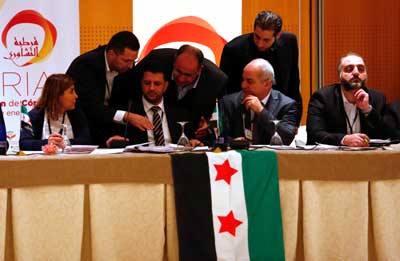
Syria opposition yet to reach agreement on Jan 22 talks
Damascus, January 11, 2014
Several factions of the Syrian opposition, meeting together for the first time, called for a new coalition but did not reach agreement on who should attend peace talks later this month, or whether they would attend at all.
With less than a fortnight to go until the first direct talks between the opposition and President Bashar al-Assad's government - set for January 22 in Switzerland and called "Geneva 2" - Western backers have struggled to unify rebel groups.
The main opposition body in exile, the National Coalition, has been plagued by bickering. It postponed a decision on whether to attend Geneva 2 until next week after nearly a quarter of its 121 members threatened to resign following the reelection of its Saudi-backed leader, Ahmad al-Jarba.
Diplomats hoped they could bring a more comprehensive group together at Friday's meeting in Cordoba - a venue offered by the Spanish government because of its historical importance as the capital of an Islamic caliphate 1,000 years ago.
A final communique from the meeting proposes setting up a committee to coordinate opposition groups, with the eventual goal of holding a national conference attended by about 1,000 people, said Yahya al-Aridi, a spokesman for the meeting.
"That is the endeavour: to focus on finding people, who have differences, but at the same time they have one common goal," he said. He added that the new committee would not be a political body, suggesting it would not replace the National Coalition, which Western and Arab countries see as the official opposition.
The communique, part of it seen by Reuters, repeated the opposition's longstanding condition that Geneva 2 should create a transitional authority for Syria in which Assad plays no role. Damascus says the president will remain in control.
The meeting saw National Coalition members sit down for the first time with opposition figures who still reside in Damascus and call for reforms, not Assad's removal. Such figures have been tolerated by the Syrian government but are at odds with many grassroots and exile opposition groups.
Also in Cordoba were members of Islamist rebel groups, a powerful section of the armed opposition that some opposition figures say needs to be included to ensure broad consensus.
However, two major groups did not officially attend: the main internal opposition body known as the National Coordinating Body (NCB), and an Islamist alliance known as the Islamic Front.
Aridi said allies of the Islamic Front were included: "People who know them, who have relations with them and who sympathise with them. So it is a wide spectrum of representation."
Veteran dissident Kamal Labwani said prominent Islamic figures including a cleric were present to help foster dialogue with "all colours of society."
The NCB said it had refused to attend after only two of its members were invited. It had planned to send 10-15 delegates.
"The meeting didn't have a clear vision and aim," Khalaf Dahowd, a member of the NCB's executive bureau, told Reuters in a text message.
Delegates mingled in the historic city, famed for its gigantic medieval mosque-turned-cathedral, and were divided into groups within the closed-door meeting, an organiser said.
US, European and Gulf states - calling themselves the "Friends of Syria" - are due to meet in Paris on Sunday to hash out how to proceed at peace talks while Assad's military position has strengthened and nearly three years of war has fostered divisions within rebel ranks.
A French diplomat, speaking on condition of anonymity, said that the opposition was right to debate whether it should attend Geneva as Damascus refuses to discuss a transition.
"There is no guarantee (the opposition) will decide to come," the diplomat said.
Western powers have supported the opposition with rhetoric but have backed away from material aid as al Qaeda-linked groups take advantage of a vacuum of power in rebel-held regions.
Syria was plunged into civil war after a violent government crackdown on an uprising against four decades of Assad family rule that erupted in March 2011.
More than 100,000 people have been killed and more than 2 million refugees have fled abroad, according to the United Nations. Another 4.25 million are displaced inside Syria.-Reuters







